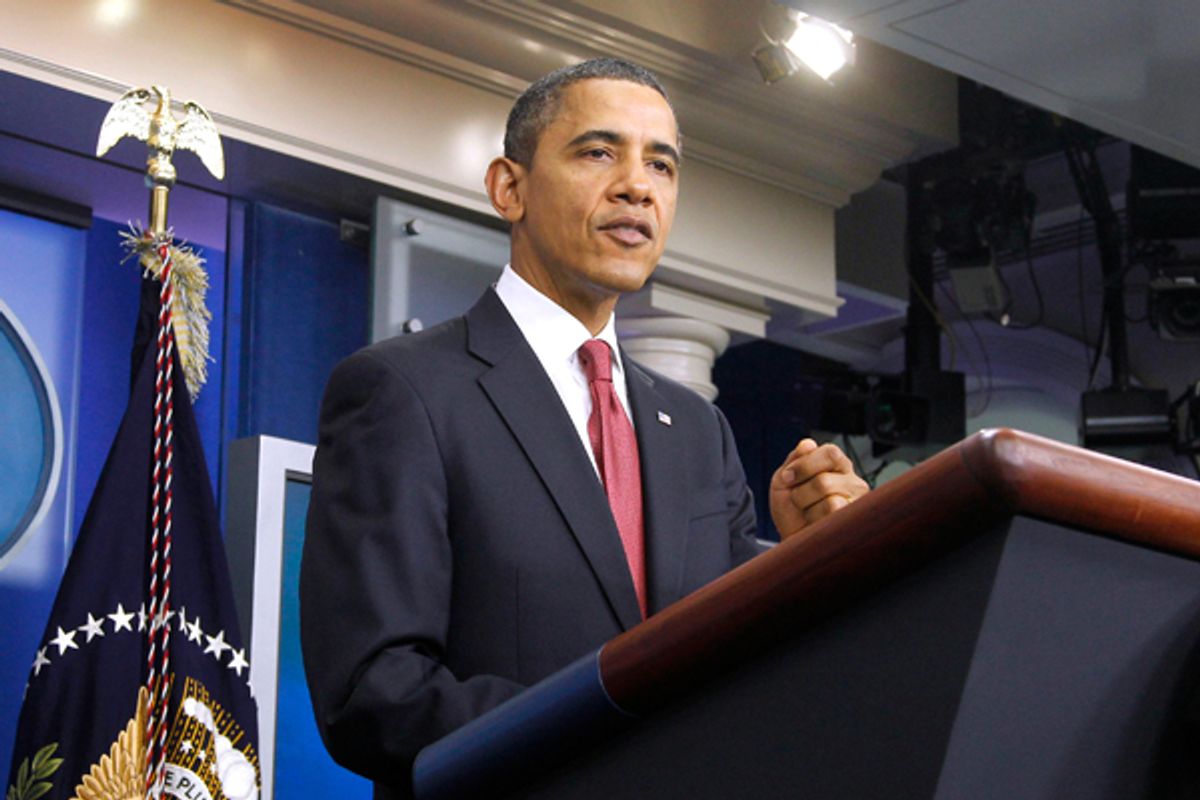President Obama's remarks this afternoon captured how dramatically his posture toward congressional Republicans has changed since this summer.
Back then, you'll recall, the political strategy that he and his team sold themselves on after their midterm election drubbing -- win back swing voters with bipartisan engagement and compromises with Republicans on major issues -- essentially hit a dead end as Speaker John Boehner was compelled by Tea Party pressure to walk away from a deficit reduction "grand bargain" that he'd once seemed ready to sign off on. The last-minute deal that was then cobbled together to ward off a debt ceiling default proved poisonously unpopular. While Republicans came in for their share of blame from the public, Obama received no credit for his months of bipartisan outreach.
This ended up being a wake-up call for the White House, which took Boehner's walk-out as proof that leaders of the Tea Party-era Republican Party are either unwilling or unable to strike meaningful deals with Obama -- not when one of the conservative base's animating principles seems to be, "If he's for it, we're against it." So beginning in September, when he used a primetime address to unveil a jobs bill, Obama embraced a new mission: to demonstrate as clearly as possible the GOP's intent to obstruct his agenda -- even (and especially) when he's pushing economic policies that enjoy broad support among the general public and independent experts. Thus was his jobs program blocked piece by piece this fall by Republican-led Senate filibusters (not to mention a lack of any action in the GOP-controlled House).
Whether the jobs bill fight actually helped make Obama's point -- or if it was lost to the Senate's slow pace, dense procedural rules, and the reluctance of a few Democrats to play along -- is an open question. But now Obama is shifting the battle to a new, more promising front: the looming expiration of payroll tax cuts.
On this subject, Republicans are increasingly nervous and divided. Without a deal to extend the cuts, which were enacted at the end of last year, the average family will see its tax bill rise by $1,000 in 2012. The GOP's congressional leaders seem to grasp the risk of being blamed for a sizable election year tax hike on tens of millions of working- and middle-class voters. This is why Senate GOP leader Mitch McConnell went out of his way last week to put his party on record supporting the concept of an extension. Some Republicans on Capitol Hill share his concern; Sens. Susan Collins and Pat Roberts have both actually voiced qualified support for the idea of financing an extension through increased taxes on the wealthy. Collins actually broke with the rest of her party and voted last week for a Democratic proposal to impose a 3.5 percent surcharge on incomes over $1,000,000 in order to cut the payroll tax rate to 3.1 percent in 2012. (It's currently at 4.2 percent, down from the traditional rate of 6.2 percent.) But to other Republicans, this represents heresy -- they'd sooner let the payroll cuts expire than sign off on any sort of tax hike on the rich.
This set the stage for Obama's appearance this afternoon, where he struck a confident tone and sought to make the GOP squirm even more. Just behind the president was a countdown clock that indicated a tax hike is just 26 days away unless action is taken. He called on Congress to "keep your word to the American people, and don't raise taxes on them right now," and belittled the GOP for its seemingly selective devotion to tax relief. "I know many Republicans have sworn an oath never to raise taxes as long as they live," Obama said. "How could it be the only time there's a catch is when it comes to raising taxes for middle-class families?" Here's the video:
Apparently, Democrats in the Senate will soon call for a vote on a tweaked extension plan, one that would impose a smaller surcharge on millionaires and make up the difference with an assortment of revenue enhancers that Republicans have previously backed. Maybe this will attract more Republican support; but even if it doesn't, Democrats are making it clear they'll keep pressing their case through the end of the year if need be. This is a new phenomenon in the 112th Congress: Obama and his party seem to have the upper hand -- and they know it.



Shares